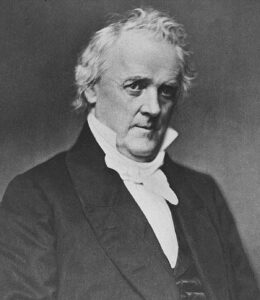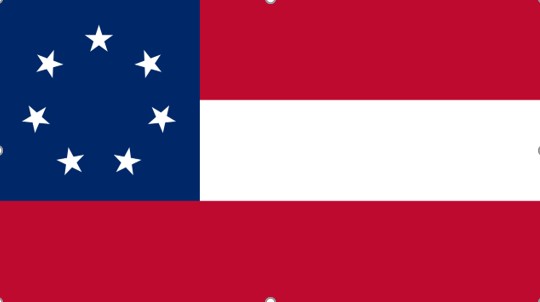Democratic (constitutionalist) President Buchanan turns the presidency over to Republican (nationalist) former Representative Abraham Lincoln, of Illinois. Buchanan is giving to Lincoln a federal debt that has expanded from 28,700,000 to 90,600,000 Dollars, going from 1 to 2% of the Gross National Product, and from 1.00 to 2.80 Dollars per person. In his inaugural address, Lincoln threatens war against the Confederate States if they do not co-operate in the collection of the protectionist Morrill Tariff:
The power confided to me will be used to hold, occupy, and possess the property and places belonging to the government, and to collect the duties and imposts; but beyond what may be necessary for these objects, there will be no invasion—no using of force against or among the people anywhere.
Lincoln also promises not to interfere with slavery where it already exists, and endorses the recently proposed 13th (Corwin) amendment to the Constitution for the united States, that would prohibit Congress from abolishing slavery in the States. … I have no objection to its [slavery] being made express and irrevocable.”
NOTES:
- The Union is still paying for the Panic of 1837 and now the Panic of 1857 through lawful Indirect (tariffs and excise) taxes placed upon manufactured goods.
- While Lincoln felt the Constitution for the united States prohibited him from interfering with “slavery [involuntary servitude] where it already exists,” he had no problem “collect[ing] the duties and imposts” of the odious and onerous Morrill protective tariff, which raised costs on southern agriculture for the benefit of northern industry and internal improvements (corporate, Republican welfare).
- Lincoln claimed credit for the proposed Corwin Amendment (forbidding Congress to pass any legislation (including proposing a constitutional Amendment) concerning slavery in any State).
- Lincoln expressed his sentiment that the power of the federal government is superior to that of the States: “The Union is much older than the Constitution.”
- Lincoln used the word “Union” (which is a union of sovereign States under a federal system, with a central government whose powers are strictly limited by a respected Constitution) 21 times but not once used the word “nation” (in which a central government, with almost limitless power, treats its constituent states as mere enclaves, provinces, or sub-divisions of its greater self).
- Livingston writes, “The Soviet Union had one of the most centralized governments in history, yet was blown to peacefully dissolve itself.”
James Ostrowski describes the “(imaginary) Amendment XI” that Lincoln must have found in the Constitution for the united States for it reflects the actions Lincoln took in his effort to “preserve the Union” (establish a nation):
- Section 1. Notwithstanding the Guarantee Clause and the Ninth and Tenth Amendments, no state may ever secede from the Union for any reason, except by an amendment pursuant to Article V.
- Section 2. If any State attempts to secede without authorization, the Federal Government shall invade such State with sufficient military force to suppress the attempted secession.
- Section 3. The Federal Government may require the militias of all states to join in the use of force against the seceding State.
- Section 4. After suppressing said secession, the Federal Government shall rule said State by martial law until such time as said State shall accept permanent federal supremacy and alter its constitution to forbid future secessions.
- Section 5. After suppressing said secession, the Federal Government shall force said State to ratify a new constitutional amendment which gives the Federal Government the right to police the states whenever it believes those states are violating the rights of their citizens.
- Section 6. The President may, of his own authority, suspend the operation of the Bill of Rights and the writ of habeas corpus, in a seceding or loyal state, if in his sole judgement, such is necessary to preserve the Union.
Ostrowski, asks, “Would the Constitution have been rarified if it contained such an amendment? Would that amendment have been ratified at any time between 1788 and 1861?
[updated 1/25/2025]
Army of the united States Major Robert Anderson, commander of Fort Sumter, South Carolina reports that his command is running out of food and water, and may soon have to be abandoned.
[restored 1/25/2025]
Subsequent Events:
Authority:
Article II, Section 1 [Clause 8]
ccc-2point0.com/constitution-for-the-united-states
Article XII of Amendment
ccc-2point0.com/constitution-for-the-united-states
References:
Bruce Catton, The Civil War, (New York: American Heritage, 1960; Boston: Houghton-Mifflin, 1987), 283.
Thomas J. DiLorenzo, “The Great Centralizer: Abraham Lincoln and the War between the States,” Cato Journal, 3 (Fall 1998): 257-58.
Thomas J. DiLorenzo, Lincoln Unmasked: What you are not supposed to know about dishonest Abe, (New York: Crown-Forum, 2006), 24, 54, 82, 126.
David H. Donald, Lincoln, (New York: Simon & Schuster, 1995), 150, 154.
Calvin D. Linton, ed. The Bicentennial Almanac: 200 Years of America, 1776-1976, (Nashville, Tennessee: Thomas Nelson, 1975), 164.
James Ostrowski, “Was the Union Army’s Invasion of the Confederate States a Lawful Act? An Analysis of President Lincoln’s Legal Arguments Against Secession,” Secession, State and Liberty, David Gordon, ed., (New Brunswick, New Jersey and London: Transaction, 1988), 158, 173, 178-79.
Abraham Lincoln’s First Inaugural Address
avalon.law.yale.edu/19th_century/lincoln1.asp
Livingston – A Moral Accounting of the Union and the Confederacy
mises.org/library/moral-accounting-union-and-confederacy
Government – Historical Debt Outstanding – Annual 1850 – 1899
www.treasurydirect.gov/govt/reports/pd/histdebt/histdebt_histo2.htm
List of Presidents of the United states – Wikipedia, the free encyclopedia
en.wikipedia.org/wiki/List_of_Presidents_of_the_United_States
Measuring Worth – GDP result.
www.measuringworth.com/datasets/usgdp/result.php
Bureau of Economic Analysis is an agency of the U.S. Department of Commerce.
www.bea.gov/national/index.html#gdp
Leviathan on the Right (How Big-Government Conservatism Brought Down the Republican Revolution) | Strike-The-Root: A Journal Of Liberty
www.strike-the-root.com/71/lfb/lfb1.html


